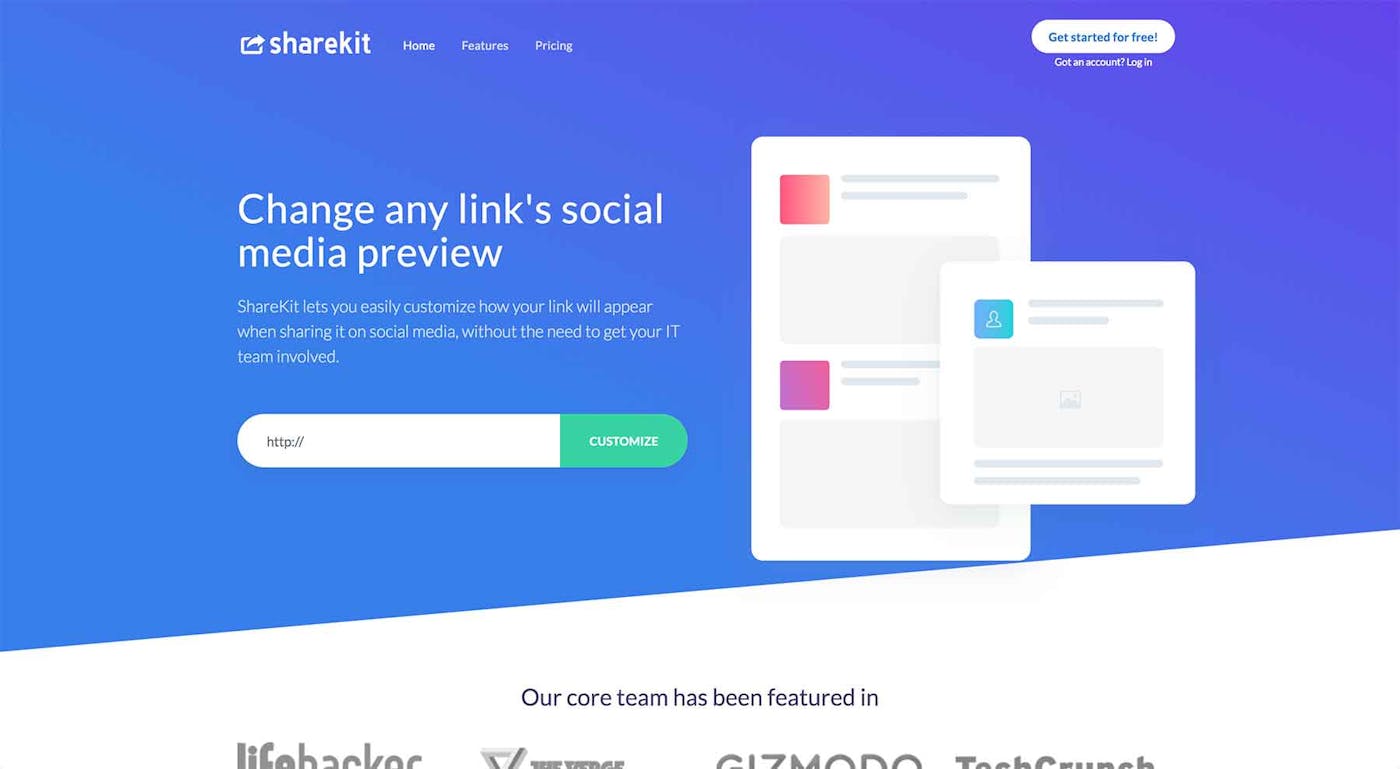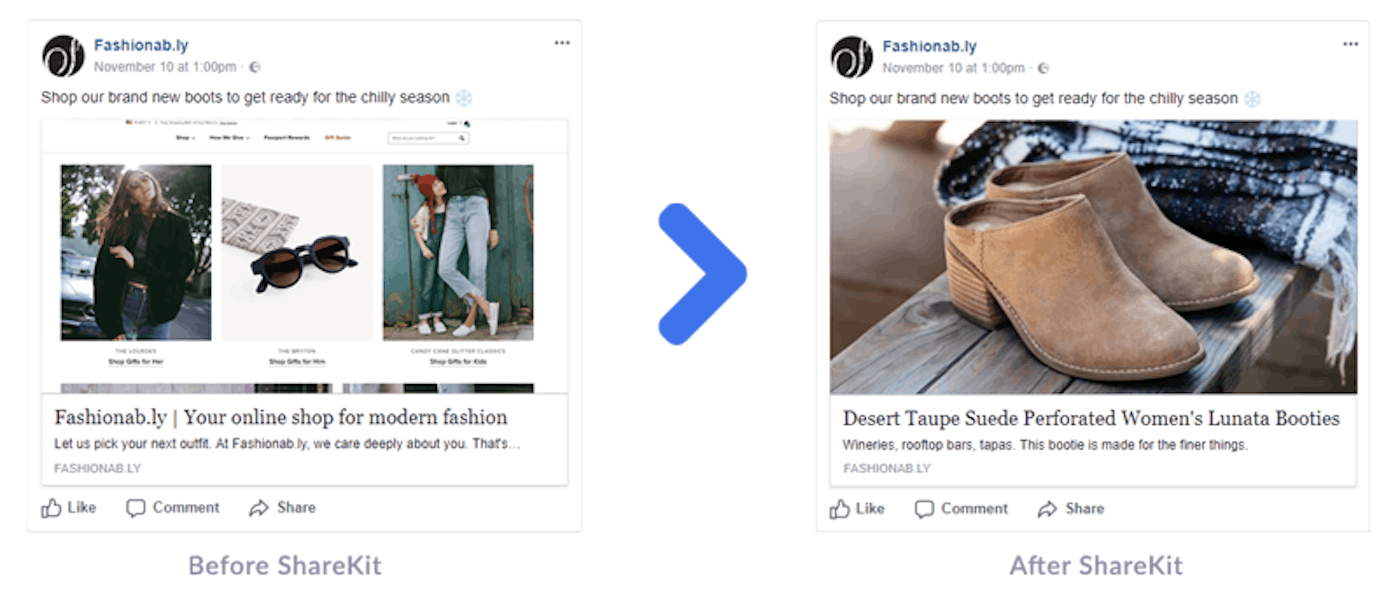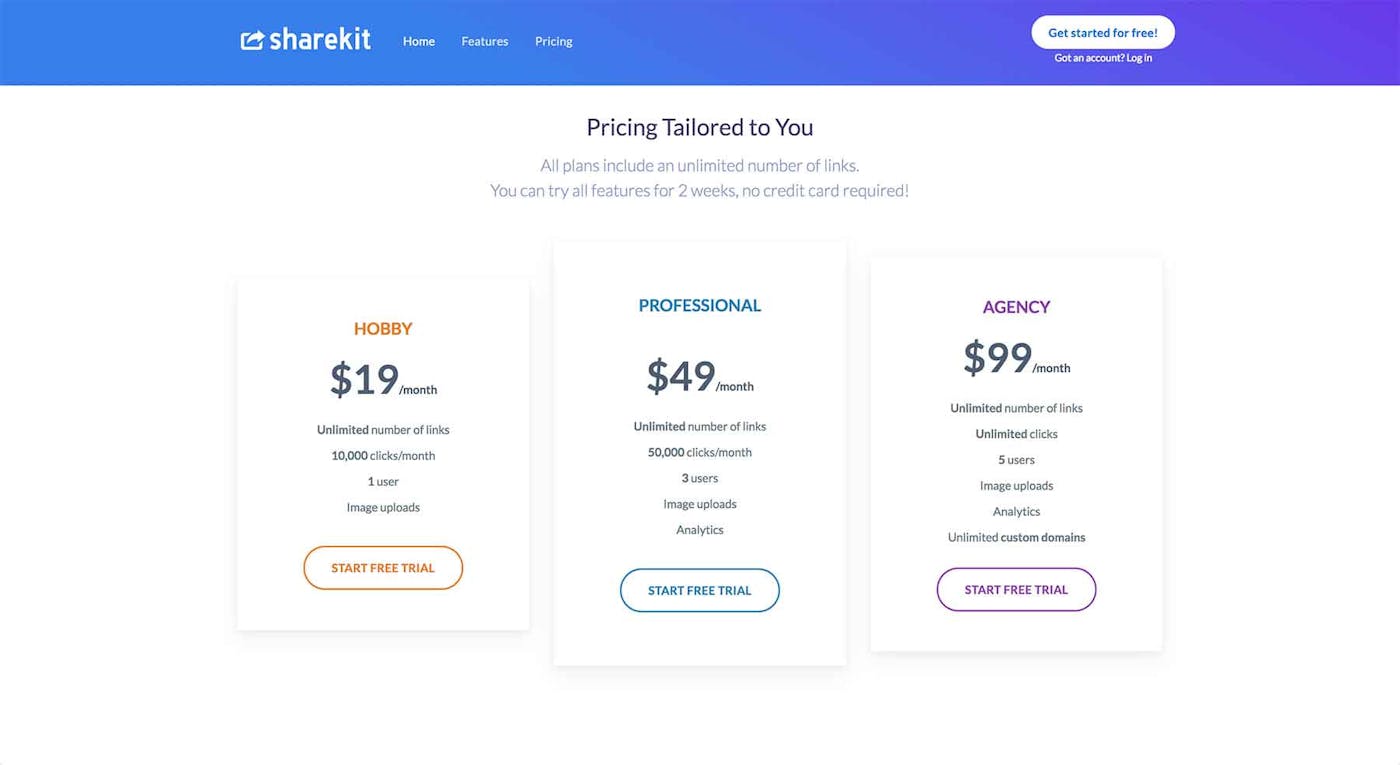Growing a Facebook Preview Editor to
$1,600/mo
Hello! What's your background, and what are you working on?
Hey, my name is Nick. I'm a software engineer by trade and have been busy working on different side projects for the last five years. When Facebook announced that they would disable the ability to customize link previews, I teamed up with two friends to develop a solution that addresses this issue for digital marketing agencies.
ShareKit.io restores the ability to edit link previews on Facebook — users simply upload an image and enter a title and description, and ShareKit.io will generate a new link that can then be posted to Facebook with a beautiful preview.
Since launching in November, we've ramped up to $1,600 in MRR. Today, ShareKit.io is used by social media managers at small and large companies, marketing agencies, and independent freelancers who care about how their (clients') Facebook pages look.

What motivated you to get started with ShareKit.io?
Most of my friends work at startups and marketing agencies, and they were floored when Facebook announced that they would no longer be able to customize the preview image, title, and description when posting a link on Facebook. A lot of their clients' websites don't define the "open graph" meta tags necessary for Facebook to generate a meaningful link preview, and the default preview is therefore often pixelated or doesn't convey the post's message.
However, they're paid to keep their clients' social profiles looking sharp, and those clients aren't satisfied with "This is Facebook's fault" as an answer to why their link previews suddenly appear generic and bland.
Facebook implemented this restriction to stop the spread of fake news, but in the process they hurt a lot of social media agencies and freelancers who have nothing to do with fake news. My friends continued to bug me to help them find a solution for this, and in September, I finally spent some long nights and weekends putting together an MVP.
What went into building the initial product?
I started working on ShareKit.io in September, and after trying to attack the problem from different angles, I arrived at a working proof-of-concept four weeks later.
ShareKit.io works by acting as an intermediary between Facebook and the target website. Users paste the link they want to share into our tool and can then customize the image, title, and description of the link preview. ShareKit.io generates a new link that is then shared to Facebook, and Facebook will display the new preview image/title/description.

Based on feedback from our early customers, I added an analytics feature and a custom domain feature, which allows our users to use their own domain when sharing a link. Since part of our product comes down to being an advanced link shortener, uptime is very important for us. We use Uptime Robot as a public status page and New Relic to monitor our AWS infrastructure.
How have you attracted users and grown ShareKit.io?
Since it solved their problem, my friends' employers were immediately willing to pay me for access to ShareKit.io. We also cold-emailed marketers who expressed their frustration with Facebook's move on Twitter and Facebook. Once we had enough feedback and initial growth to establish product-market-fit, we launched on Product Hunt, which lead to a spike in traffic and new sign-ups.
Now, we're starting to experiment with Google and Facebook ads and are reaching out to social media blogs for guest posting opportunities. We're also continuing to contact social media managers directly via LinkedIn and are responding to cries for help on Twitter. To increase conversions from trial to paying users, we implemented a drip campaign which shows off the different features of ShareKit.io (e.g. analytics and our custom domains option) to encourage people to upgrade to a paid plan.
What's your business model, and how have you grown your revenue?
We offer a free two-week trial and then ask users to select from three monthly subscription plans, each aimed at different personas (freelancers, full-time social media managers, and agencies).
Our agency package allows our clients to use their existing domains when sharing a ShareKit.io-link, which drives sign-ups for the largest plan. We've been charging from day one and use Stripe to process payments. Our conversion rate from site visitors to free trial signups currently sits at 10%, and we convert 3% of trial users to a subscription. So far, our churn has been an awesome 0% — fingers crossed that it stays that way! We're currently making $1,600 in MRR. We'll likely try out higher price points in the near future and maybe introduce an "unlimited everything" plan for enterprise customers.

What are your goals for the future?
At the moment, we're laser-focused on growing our traffic — we're happy with our conversion and churn rates, and our users love the product. We'd like to hit $5,000 MRR by mid-2018, and I think that based on our current trajectory, that's achievable.
In terms of our goals for the product itself, we'd like to make it easier to A/B test different link previews — at the moment, you can already use ShareKit.io to split-test which link preview is best received by your audience by generating two ShareKit.io URLs for the same target URL. However, we'd like to turn this into an actual feature, where ShareKit.io compares the performance of both previews over the same time period and provides users with a statistically valid answer based on the number of clicks on each link.
We're continually talking to our customers to find out what features they'd like to see next and are basing our to-do list on their answers.
What are the biggest challenges you've faced and obstacles you've overcome? If you had to start over, what would you do differently?
In the beginning, we were playing a cat-and-mouse game with scaling up our infrastructure. Whenever a new agency would sign up, they'd often bring in millions of clicks from their clients' social media pages, which we had to handle gracefully by immediately adding capacity.
Now, we're using autoscaling to automatically react to our growth. There's always a trade-off between delivering a perfect product from the very beginning and reducing time to market — if I had to do it again, I probably wouldn't change my approach, since there's no point in having an elaborate autoscaling system if you have zero customers and aren't yet sure if you'll ever grow out of your current server.
Have you found anything particularly helpful or advantageous?
The fact that I had worked on multiple "hobby" side projects was super helpful in getting an early MVP of ShareKit.io out of the door quickly. Even if your aim isn't to make money, you learn a lot by going through the process of validating an idea, developing the product, launching it, and marketing it.
I would start with something that you care deeply about and are already immersed in — this makes it easier to know what your users want (because you're a user yourself) and you know where you can find potential users (because they hang out in the same places as you). Explicitly framing it as a "just for fun" project reduces the pressure to grow quickly.
What's your advice for indie hackers who are just starting out?
Having some early customers who worked with us to nail the product itself was incredibly valuable. If you can, work on something that is a proven pain point for people (which they've actually told you and isn't just based on your guesswork).
Talk to your extended network — people love sharing their day-to-day business problems if they think you can help. Make sure you talk to multiple people to confirm that the problem exists for all of them. Don't be afraid to pick a niche — you can always expand your focus later on, but you can't fix not having a clear target customer and go-to-market strategy.
Try to spot openings in the market, which often appear suddenly. If a big player like Facebook or Dropbox changes something that enrages a lot of people, chances are that you can come up with an alternative or a solution that will have them sold instantly.
On a broader scale, the same goes for legal changes, like market deregulations that you can take advantage of. Peter Thiel's Zero to One talks more about these kinds of opportunities, and I think they're currently underrepresented in what indie hackers and SaaS businesses are working on, because they may not be as glamorous as a blockchain-enabled machine learning startup.
Where can we go to learn more?
- Our website: https://www.sharekit.io
- Our blog: https://blog.sharekit.io/
Feel free to ask questions in the comment section or email me at nick@sharekit.io!
